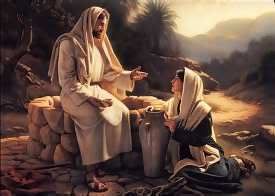John, Chapter 4 (Woman at the well)
You can read and cross-reference John, Chapter 4. I believe it’s important to look at some background information that may help to understand the events of Chapter 4 in their proper context.
Palestine at the time was divided into 3 sections: Judea in the South, Galilee in the North, and Samaria in between. North to South, the entire area ran only 100 to 120 miles. During the time of the Assyrian captivity, Jews were taken to Assyria and other races were brought in to replace them. These people intermarried with the Jews that remained in Samaria, creating a mixed breed of people that were detested by the Jews of Judea and Galilee. The Samaritans only recognized the Pentateuch (the first five books of the Old Testament also known as the Torah) as their inspired Scripture. They had set up worship on Mt. Gerazim. The Jews had worship in the Temple at Jerusalem.
Since the Jews wanted nothing to do with Samaritans, when traveling from Judea to Galilee they would take the much longer route around Samaria. This required traveling along the coast or through Perea, rather than through it (a difference of 3 or 4 days travel). It would be like leaving Texas on your way to Kansas and going around Oklahoma. Jesus, however, went straight through the heart of Samaria, and in so doing, provided us with a model for how to carry out the Great Commission.
Jesus went to where the people who needed his message were. Jesus “needed to go through Samaria”. He would save a great deal of time going through Samaria to get to Galilee. But, when the emphasis on “needed” is seen in relation to Jesus’ overall mission (“the Son of Man has come to seek and to save that which was lost” Luke 19:10) and specifically what happened at the well. I think we see that the need for Jesus to go through Samaria had much more to do with the souls of the people of Sychar than with quick travel.
For us, I think the lesson is simply that we need to be on the lookout for opportunities to share the gospel, and that means getting out into the world. We may not get the lost to come into our specific church, even if we invite them; if not, our mission is to go out there and meet them where they are.
Jesus met people where they were. Jesus met this woman at the exact time and place that she would be most receptive. The time was important enough that John recorded it for us. She would never have entered a synagogue or the courts of the Temple to hear Him teach. We need to realize that most of the time, if people are going to come to know Christ, they are not simply going to wander into our churches: we have to go out and get them.
This also means meeting people where they are spiritually, emotionally, and physically. Here is an example of meeting people where they are. This pastor had a heart for the lost, and as a result, many of the “flower children” in the area began attending his church. About this time new carpet was installed in the foyer and sanctuary. It was thick, beautiful, and baby blue. One evening the deacons complained that these street kids were coming in with sandals, or no shoes at all, and tracking dirt on the new carpet, and something must be done about it. The pastor left, and when he had not returned for some time, the deacons went to look for him. They found him on his hands and knees, ripping up the new carpet. He looked up at them and said: “We do not need this carpet, but we MUST have those kids.”
It seems that sometimes we don’t take the phrase “come just as you are” as literally as we should. Jesus met this woman where she was, and He accepted her as she was, but He loved her too much to leave her as she was.
He had a sense of urgency. We need to go now. Jesus tells the disciples “Do you not say, ‘there are still four months and then comes the harvest’? Behold, I say to you, lift up your eyes and look at the fields, for they are already white for harvest! (John 4:35)”. We have a tendency to look at evangelism as something we’ll do later, when we’re more equipped, or when the time is more appropriate. This is something that I think is happening to many people and churches all over America right now. Everyone is preparing for some large outreach program or event that will happen in the future, and certainly we should be doing this. But while some look ahead several months to what they expect will be a great harvest, how many people are ready to hear the Good News right now? And how many of them will never hear because we waited to tell them and missed the opportunity?
Now I would like to compare the response of the woman at the well with the actions of the disciples. Each had spent time with Jesus, although the woman’s time was far, far shorter, and each had a very different response to His message. The disciples had been in the city buying food during the time that Jesus had the conversation with the woman, and they returned at the end of the encounter. It was obvious that they had succeeded in bringing food back to Jesus; it was equally obvious that they failed in the far greater mission of bringing lost souls to Him. They had been in the city of Sychar, walking through the shops and mingling with the people, and yet the twelve of them did not bring a single person to meet Jesus.
There are several possible reasons for this failure:
a. They were so preoccupied with their own needs they did not think of the needs of others. Preoccupation is a great danger for us as well. We can become so wrapped up in work, school, family, soccer games, etc. that we don’t leave room for eternal things. We can focus on our own needs and wants so much that we forget about the needs of others. We can become so consumed with the physical that we too forget the spiritual.
b. As faithful Jews, the disciples had an almost inbred hatred of Samaritans. It may have never occurred to them that God could love these people or that the Samaritans might long to know God. The Samaritans were not their kind of people. They were of a different race, a different religion, and a different culture. Because of their prejudice, the disciples essentially saw the Samaritans as inferior, and therefore missed the fact that they too needed a relationship with Christ. We do the same thing today. The only truly segregated institution left in America today is the Church. We overlook (intentionally or not) many of those who are different from us, from the homeless to the Muslims to the kid with more body piercings than teeth. But when Jesus tells us to go to the entire world, He means everyone.
c. They were so concerned with doing work for Jesus (buying bread) that they forgot to be about the work of Jesus. They missed the individuals they came into contact with and the needs of these individuals because they were “on a mission” to get bread. We too can become so caught up in committees and programs and church functions that we forget why Christ left us here after He saved us. We need to be about His work. And this work always involves leading individuals to Christ. Even the huge numbers that are saved at large Crusades are in reality saved as a bunch of individuals.
The woman has a response that is completely different than that of the disciples. In contrast to their indifference, she can hardly wait to run back to the city to tell everyone who will listen about Jesus. She is acting on Romans 10:14-15 years before it’s even written:
How, then, can they call on the one they have not believed in? And how can they believe in the one of whom they have not heard? And how can they hear without someone preaching to them? And how can they preach unless they are sent? As it is written, “How beautiful are the feet of those who bring good news!”
We need to remember that this woman was a virtual outcast even among the Samaritans. She came to the well in the middle of the day because it was a time when no one else would be there. Her reputation was certainly not pristine. And yet she ignored the possibility of rejection and ridicule in order to tell these people about Jesus. And they came on the strength of her testimony. She told them, and the Holy Spirit did the rest. And unlike the disciples, who were basically chastised by Jesus for not recognizing that the harvest was at hand, she was able to see fruit from her testimony.
“Then they said to the woman, ‘Now we believe, not because of what you said, for we ourselves have heard Him and we know that this is indeed the Christ, the Savior of the world’.”
This is not unusual even today. Many times it is the new believer that is most effective in the work of evangelism. They may not know all the verses or all the answers to objections, but they are on fire to do one thing: tell people what Jesus has done in their life. That’s exactly what we are called to do every day. Even though the disciples, like many of us, missed out on an opportunity that was right in front of them, Jesus gives them, and us, assurance of blessings when we are obedient to the Great Commission.
“And he who reaps receives wages, and gathers fruit for eternal life, that both he who sows and he who reaps may rejoice together. For in this the saying is true: ‘One sows and another reaps.’ I sent you to reap that for which you have not labored; others have labored, and you have entered into their labors.”
Contained within these verses are the promise of three distinct blessings:
a. The promise of reward (“wages”) for doing the work of evangelism
b. Fruit that brings eternal rejoicing
c. The joy of sharing this task with other believers
Who do you most identify with? Is it the woman, who ran off without fear to tell others about Christ? Or is it the disciples, who missed numerous opportunities but are given the chance to do better? Whichever more fits you, you cannot rest on your past accomplishments or lament your past failures. The harvest is now, and the Lord needs laborers. (John 4:36-38) (John 4:42)











